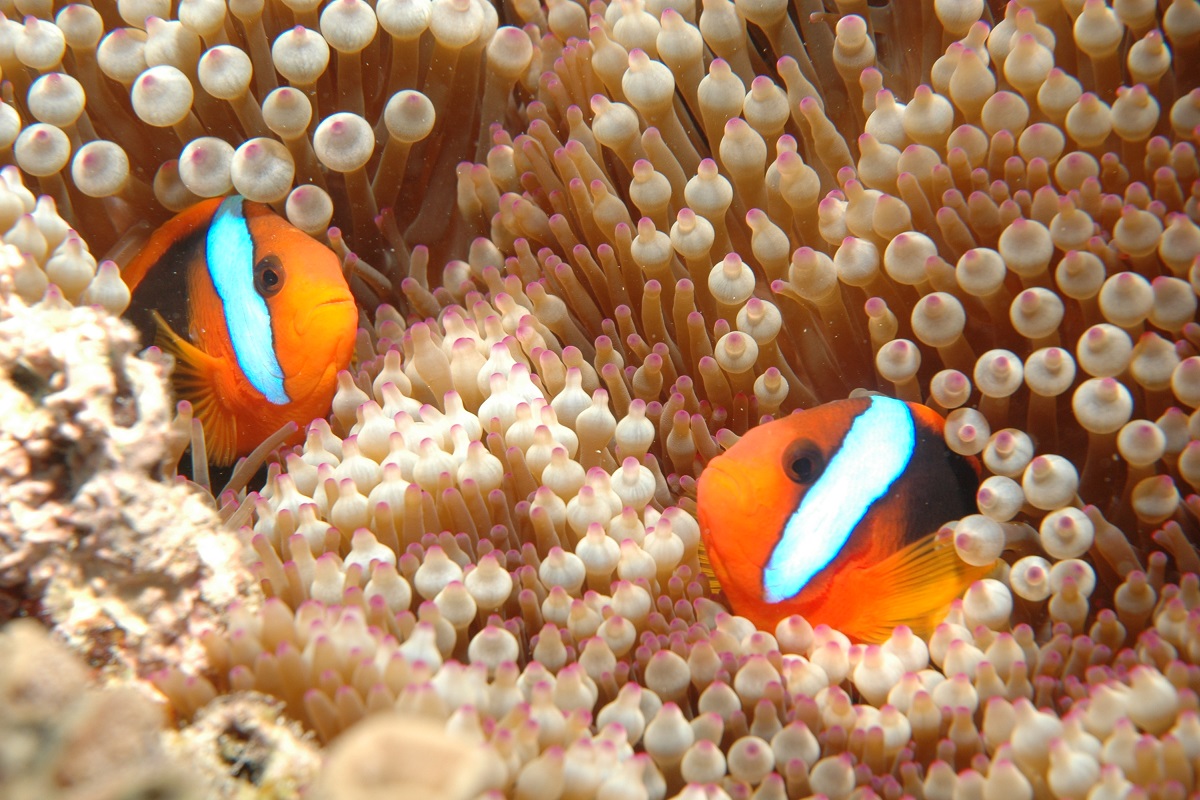Humans and mammals have to get some shuteye, but what about fish?
While it may look like your fish are never sleeping, do they get to rest just like you?
Do fish sleep all night or take naps during the day? When do fish sleep, and where? How do fish sleep and breathe at the same time? Are their sleeping patterns similar to ours?
To find out more about the behavior of your aquarium’s residents and answer the question of whether they sleep, we’ll look at the definition of sleep and fish behavior.
Contents
What is Sleep Actually?
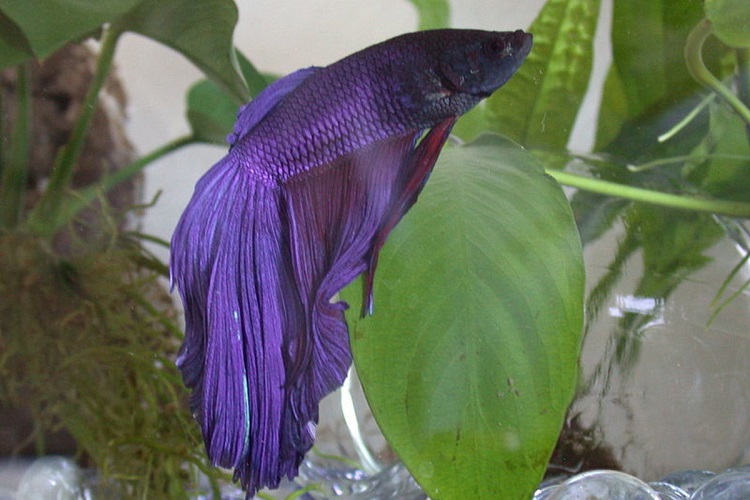
Animals sleep, humans sleep, but what is sleep? Until the 1950s, scientists believed sleep was a passive, dormant period.
Now we know that, while the body may be still during sleep, the brain is very active. Sleep is restorative, with the brain and other organs producing growth hormones and helping the body operate more efficiently during awake hours.
While most animals sleep, their sleep-related brain waves can be recorded in the brain’s neocortex. Fish do not have a neocortex, but these brain waves, similar to REM sleep in humans, have been recorded in the dorsal pallium area of their brains.
A sleep-like state has been documented in fish including rays, zebrafish, Spanish hogfish, parrotfish, goldfish, perch, banded knifefish, and sharks. Scientists consider brain activity and behavior when noting sleep in fish and other animals.
For fish, other animals, and people, sleep is a chance to rest and recover, make needed repairs to cells, and grow.
Getting the proper amount of sleep brings better health, energy, and vitality. Sleep is an essential part of the health of your fish and aquarium.
How Do Fish Sleep?
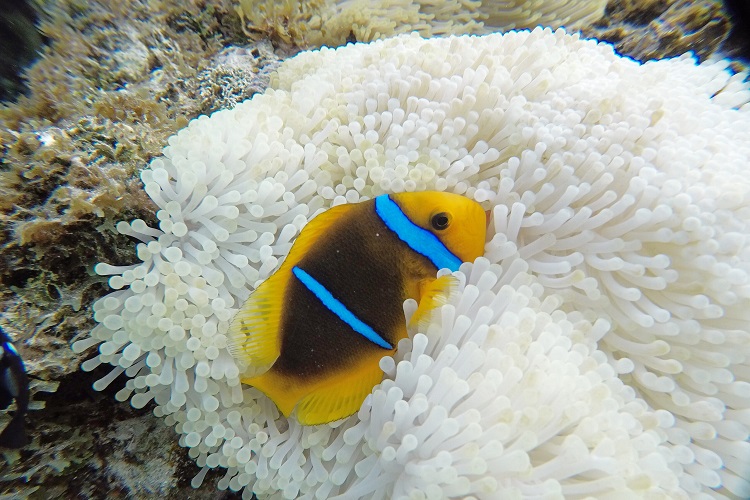
The answer to whether fish sleep is yes. Aquarium fish brain activity proves that these beautiful creatures sleep as part of a healthy life.
They, like humans and animals, sleep. How fish sleep can depend on the type of fish and the environment.
Smaller fish such as rainbow wrasse and zebrafish are diurnal, sleeping at night. When they sleep, they stop swimming and are motionless unless stimuli awaken them. However, sharks are nocturnal, meaning that they are active at night and sleep by day.
Where fish live can determine how much sleep they need. Cave-dwelling fish have been found to sleep less than fish that live closer to the surface of the water in rivers and lakes.
You may wonder how fish breathe while sleeping. Some types of fish open and close their mouths while sleeping to move water over their gills. Other types of fish have to keep swimming while sleeping to continue to breathe. Some even sleep with part of their brain, using the other part to swim and breathe.
Signs your aquarium fish are sleeping include being motionless, hovering at the bottom of the aquarium, and not reacting to stimuli. Usually, sleep will happen at about the same time of day, usually when the aquarium light is off.
Where Do Fish Sleep?
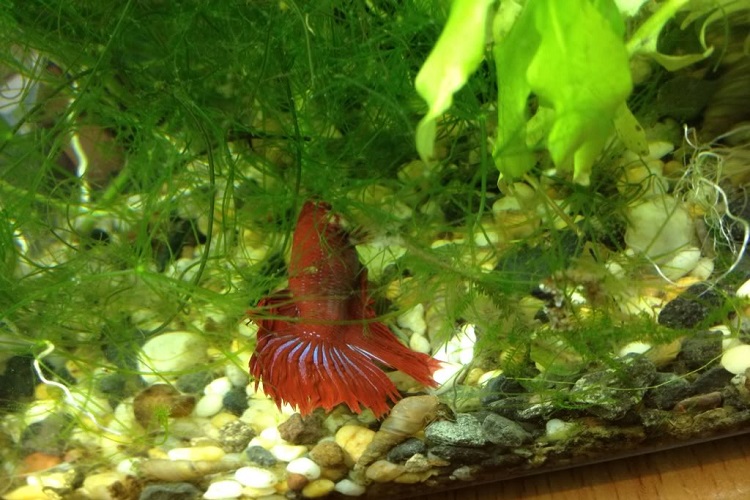
If fish take naps, where do they sleep? Some fish don’t have to think about where they will sleep because they sleep while they swim. Other fish float while sleeping, so all they need is water.
Some types of fish like to hide from predators while they sleep.
Parrotfish, for example, sleep under coral for protection and create a mucus cocoon for sleeping. The rainbow wrasse hides from predators by burrowing into the sand just before falling asleep.
If the fish in your aquarium like to sleep in caves and amid coral or aquatic plants, consider adding plants, coral, rocks, driftwood, or an ornament to your aquarium.
If you see your fish hiding deep inside a hollow log or tiny pirate ship, don’t panic. For your fish, this behavior is normal for sleeping and is thought to make them feel safe and secure.
When Do Fish Sleep?
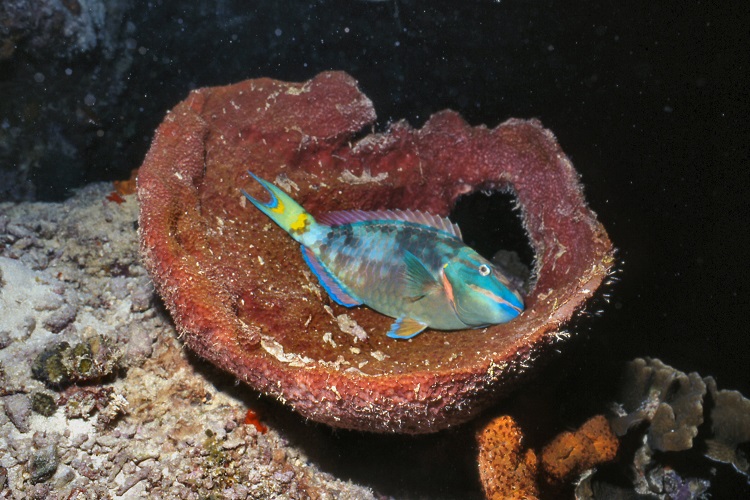
Biologists think fish have regular sleep schedules just like humans and other animals. Most aquarium fish sleep at night and swim about during the day, which makes them fun to watch during your day.
Some types of aquarium fish are nocturnal, though. Combining diurnal and nocturnal fish in the same aquarium can be a problem. Having a nocturnal catfish with neon Tetras that sleep during the night may result in the catfish making a meal out of the Tetras while they sleep.
There are exceptions to these rules. Many fish don’t sleep at all when they’re caring for their young or migrating. Tilapia is among breeds of fish that don’t slide until they are about 6 months old.
Most fish sleep, though, which means that they can have sleep disorders when they don’t get their rest. Studies have suggested that fish that are disturbed by stimuli to keep them from sleeping will take naps to catch up on their missed sleep.
Biologists think that light could inhibit the production of melatonin in fish, keeping them from sleeping. It’s important to keep aquarium lights on a schedule, leaving them off during the night so fish can get their sleep.
Provide fish with places to hide during sleep so they feel safe and comforted. It’s fun to see them find spots to sleep.
How Do I Make Sure My Fish Gets Enough Rest?
As a fish lover concerned about your pets getting enough sleep, there are some steps you can take to help your fish have quality rest. However, ensure you know the type of fish you keep and its biological characteristics, as such knowledge will help determine the best suitable sleep habit for them. With that said, below are some of these steps.
1. Feed Your Fish at the Right Time
As humans, we ensure we get two to three hours before bedtime for various reasons. But two of the primary reasons are to prevent indigestion and having trouble sleeping. As a result, it is crucial to know the time your fish sleeps to prevent you from feeding them late.

Digestion requires energy, and after a meal, your fish will need time to digest the food, and most fish will want to rest and conserve their energy during that period. On that note, if your fish is nocturnal, it is best to feed them during the night, while diurnals are best fed during the day.
2. Distinguish Day and Night
The most common and straightforward way to make your fish get enough rest is to create day and night time for them. Keeping your fish in an aquarium tank, you need to ensure that they experience life close to what they had in their natural habitat. You can do so by giving your fish a day and night schedule, which enables them to have enough rest.
If you feel it will be challenging to keep to the schedule, you can put your aquarium light on a timer, which is an easy way to get the job done. This is because the timer will turn the lights on and off at whatever time you set them. With your fish getting enough rest daily, they get to stay healthy.
3. Make Your Fish Comfortable
Providing a comfortable living ecosystem for your fish helps them to sleep. The lighting, temperature, water quality, and aeration, among others, play a role in the sleep quality they will get. For that reason, it is advisable to create a comfortable ecosystem for your fish by adding things that are present in their natural habitat, for example, plants, coral, and rocks.
Note that most species share a similar type of environment. However, add things that are best suited for the species of fish you keep.
Conclusion
Like humans and other animals, most fish sleep and are on a regular sleep schedule.
Not only do fish have a sleep cycle, but if the cycle is disrupted, fish will catch up on missed sleep by taking naps.
Fish need to recharge and grow, and they do those things best when they get the right amount of sleep.
Aquarium owners can help their fish live healthier lives by being aware of their fishes’ sleep cycles, providing dark hours without aquarium lights, and placing plants, driftwood, and other ornaments in the aquarium where fish can hide when they want a little privacy for sleep.
For most aquarium fish, a good night’s sleep results in more energy during the day. If your fish get their rest at night, they’ll be more lively and more fun to watch during the day.

Ian Sterling, founder of Fishlab.com, began his aquarium journey over 30 years ago, driven by a deep fascination for fish and their diverse personalities. His website, Fishlab.com, is dedicated to making fishkeeping accessible and enjoyable, offering beginner-friendly guidance, expert insights, and a community for aquarists to connect and share experiences.


